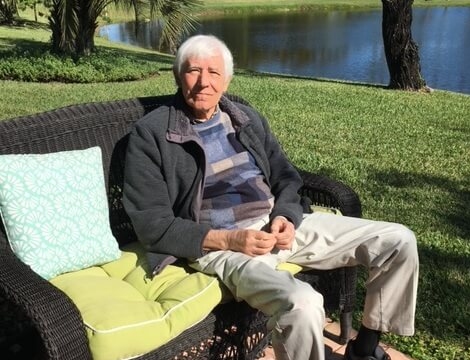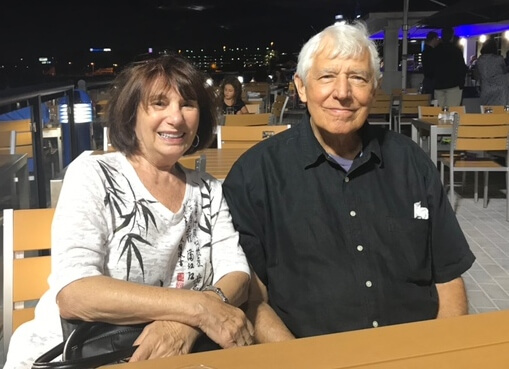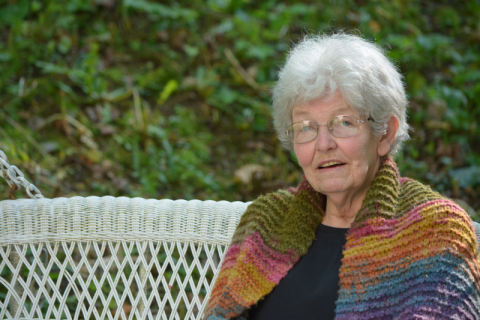Mesothelioma Survivor Thriving With Support, Positive Attitude

Fact Checked | Written by: Tim Povtak | Last Update: 06/26/2025 | 5 Min Read
Two weeks before undergoing aggressive, life-changing surgery for mesothelioma cancer, Michael Bederman was driving a rented motor home more than 1,000 miles through Alaska, a trip he insisted on taking despite knowing what awaited.
Just two months after his seven-hour pleurectomy and decortication surgery, he drove his own recreational vehicle from his former home in Connecticut to his new residence in South Florida.
Again, he refused to yield.
This mesothelioma survivor would not be denied.
“Yes, he’s kind of a macho guy,” said Lee Bailes, longtime companion and love of his life. “He wouldn’t let anyone else drive. And he’ll never ask for directions. Doesn’t like the GPS, cellphones or technology to tell him where to go. I can’t tell you how many fights we’ve had over directions.”
Life is good today.
“I don’t know what tomorrow will bring. No one does,” Bederman said. “So why worry? I love driving. Why not? I made it.”
Support Has Been Key for Mesothelioma Survivor
Bederman, 80, celebrates each day of his retirement in Boca Raton, buoyed by a positive attitude, effective treatment and Bailes. She has guided and supported him on this journey, through the good days and the inevitable bad.
Bederman was diagnosed with pleural mesothelioma in the spring of 2018, almost a year after he first started having problems with shortness of breath and pleural effusions that needed to be drained every few months. It was only after he and Bailes suggested a biopsy and more tests to his doctors in Connecticut that he was diagnosed.
The operation was performed on June 26, 2018, by thoracic surgeon and mesothelioma specialist Dr. Andrea Wolf at Mount Sinai Hospital in New York City.
Although recovery was difficult, Bederman was back in the driver’s seat heading to Florida by August, with Bailes riding shotgun.
“She has been my godsend,” Bederman said. “A savior to me, both mentally and physically. We think a lot alike – very positive. Without her, I’d be nowhere today. You couldn’t get through this without someone like her beside you.”
Bailes smiles at his appreciation, but she is equally grateful to Karen Selby, patient advocate for The Mesothelioma Center at Asbestos.com. Selby has guided her through a caregiving role that can be overwhelming at times.
“Karen has been my angel. I can’t tell you how amazing she has been, through every step of the way,” Bailes said. “Her knowledge has been golden for us. From connecting us with specialists, to just bouncing ideas off her, I could not have done this for Michael without her. We’d be lost.”

Helping Connect with Mesothelioma Specialists
Selby is the one who quickly introduced them to Wolf and her team, which included renowned thoracic surgeon Dr. Raja Flores. Their quick, next-day appointment came after another New York City cancer center only offered Bederman an appointment three weeks out.
She also found them a medical team at Baptist Health in Boca Raton that handled mesothelioma treatment, along with a second opinion at Moffitt Cancer Center in Tampa, where they are considering an upcoming clinical trial for mesothelioma.
Selby, a registered nurse with a background in thoracic surgery, has been an invaluable, easily available consultant for Bailes, who initially felt overwhelmed as a caregiver.
“First thing I would tell a newly diagnosed patient would be to get connected with Karen,” Bailes said. “That has made a huge difference for us.”
Mesothelioma Doesn’t Keep Him Down
Bederman, meanwhile, has become a lesson for others to follow, rejecting the gloom-and-doom attitude that often engulfs a patient with pleural mesothelioma.
His surgery was followed by chemotherapy and radiation. He had a less-extensive follow-up surgery with Dr. John Roberts at Baptist Health.
Bederman is currently undergoing regular infusions of Keytruda, the immunotherapy drug that has been effective for only a small percentage of mesothelioma patients. For him, though, it seems to be delaying the almost inevitable cancer recurrence.
His most troubling problems now have been a lack of energy, forgetfulness and a numbness in his hand. A thyroid problem may be a side effect of the immunotherapy drug. He also has been dealing with a pacemaker for more than three years.
Instead of talking about survival, though, Bederman would rather talk about the alligator in the lake behind their home, or the nearby nature preserve where he often admires the wildlife, including the python he saw a month ago.
“Everything with me will work out for the best,” he said. “I don’t sit around feeling sorry for myself. Not at all. I’m grateful for every day, and for all the help I’ve received. This is beautiful here. I look for the good in everything.”
Survivor’s Motto: Life Is Good
Bederman spent much of his working life as an electrician in Connecticut, owning a company that did both residential and commercial work. Its hallmark was credibility, which comes as no surprise. Almost until he was diagnosed, he was still working at least part time. He was blue collar all the way.
Until recent years, Bederman rarely saw a doctor. Annual checkups were unnecessary. Health insurance was for others. Even now, Bailes coordinates his medical schedule. She pushes him to exercise and encourages him to walk regularly.
She believes strongly in a holistic approach to care and thinks doctors should be more in tune with the mind-body connection.
Bederman never asked what the median survival time was for a mesothelioma patient, something he already has exceeded as he nears the three-year mark. That was somebody else’s business.
“I don’t go there. During surgery, they took out one of my ribs, but I don’t miss it,” he said. “I can laugh about it.
“Treat everyone with kindness,” he added. “That’s the important thing to remember. Life is good.”





